Lets make it very clear that the purpose of this article is truth over lies.
Let me also make it clearly to the enemy of the National Front that this articles intention is to paint a picture of fact rather than stare at a picture of fiction.
No other name is so firmly associated with the term propaganda, conjuring lies and deceit, than that of Dr. Joseph Goebbels. But the popular image of this man, particularly in the United States, is a crude caricature.
Following his birth in 1897 in Rheydt, a medium-size city in the German Rhineland, Paul Joseph Goebbels was raised in a solidly middle-class, staunchly Roman Catholic family.
Although physically unimpressive and handicapped (one leg was shorter than the other), he was gifted with intelligence, a quick tongue and a melodious voice. He excelled in his studies. After a rigorous Gymnasium "humanistic" education, he studied at several German universities, receiving a doctorate from Heidelberg University in 1921.
After an unsuccessful effort to find employment as a writer for major national daily papers, and a nine-month stint working at a bank in Cologne, he became an activist in the fledgling National Socialist Party, and served as editor of two party periodicals, the weekly Völkische Freiheit ("National Freedom") and, later, of NS-Briefe ("NS Letters").
With pronounced working class sympathies, and even some pro-Communist sentiments, during this period he was known as a member of the Party's "left wing."
In 1926, Hitler appointed him Gauleiter for Berlin. He lost no time taking firm control of the small and feuding Party organization there, and infusing it with new dynamism. Goebbels threw himself into his task, quickly proving himself a master organizer and public speaker. As part of his ceaseless efforts in Germany's most important city, in July 1927 he started his own newspaper, Der Angriff ("The Attack").
Goebbels' faced an uphill battle because he aimed, above all, to win support from the city's working class population – which overwhelmingly supported the Marxist Social Democratic and Communist parties – while at the same time not alienating middle class voters.
This strategy was perhaps most severely tested during the 1932 Berlin transport workers strike, which paralyzed the great city's bus, elevated railway and subway systems. Only the National Socialists and the Communists supported the workers in their strike against the city government, which was controlled by the Social Democratic party. The result was an odd temporary "Nazi-Commie" alliance that alarmed many middle class Germans.
Goebbels missed no opportunity for humor, sarcasm or mockery. When the Social Democratic government banned the wearing of uniforms by the Party's brownshirted stormtroopers – its paramilitary citizens militia – Goebbels mocked the ban by having the men march in public, costumed in stovepipe hats, paper caps, and similar items.
Another stunt he organized was a "debate" with Chancellor Heinrich Brüning. Because Brüning refused to participate, Goebbels "debated" an empty chair, responding – in Rush Limbaugh style – to a phonograph recording of a speech by the Chancellor. With wit and sarcasm, Goebbels "ironed flat" his colorless opponent – to roars of laughter from the mass audience.
Berliners loved such audacious spectacles, and showed their appreciation at the ballot box. In May 1928 Goebbels was elected as a deputy to the German parliament (Reichstag), and six months later was elected to the city council.
In 1929 Hitler named him director of propaganda for the entire National Socialist party, a demanding post of considerable responsibility. In spite of formidable and sometimes violent opposition – Party speakers were routinely banned, for example, and Hitler's voice was not permitted on German radio – the National Socialist movement grew rapidly during this period. By 1932 Hitler's Party had become Germany's most important, with by far the largest faction in the Reichstag.
The Party's vast propaganda and publishing empire – supervised by Goebbels – included 120 daily or weekly newspapers regularly read by about a million people across the country.
With a distinctly youthful leadership, the National Socialist movement was especially popular among younger Germans. For example, by the time Hitler became Chancellor, National Socialists had already swept the student council elections in German universities.
On January 30, 1933, President Paul von Hindenburg named Hitler as Chancellor, entrusting the 43-year-old former First World War corporal with responsibility for governing an economically devastated nation on the verge of civil war.
Six weeks after the National Socialist "seizure of power," the 35-year-old Goebbels was named "Reich Minister for Propaganda and Popular Enlightenment." In this position, and as President of the "Reich Culture Chamber" (Reichskulturkammer), he exercised wide control over Germany's radio, film, newspapers, periodical press and book publishing, as well as over the nation's cultural life.
During the first years of the Second World War, 1939 to 1942, Goebbels' job as Propaganda Minister was relatively easy. With an almost unbroken string of German and Axis military victories, maintaining public morale was not difficult. His greatest challenge came during the final two years of the war, as Germany's armies suffered ever more terrible military reverses, her great cities crumbling into ruins under a growing storm of British-American bombings, and with utter defeat looming.
It was during this period that Goebbels' most dramatically proved his skill as a master molder of public opinion. In spite of the drastically worsening situation – both militarily and on home front – he largely succeeded in maintaining public morale, confidence in Hitler's leadership, and even hope.
Although German historian Helmut Heiber paints a highly critical and generally unflattering portrait in his biography, Goebbels (New York: Hawthorn, 1972), at the same time, he acknowledges Goebbels' talents and strengths.
He notes:
[Goebbels] was able, until the very last minute, to encourage and exploit a blind trust in Hitler and his genius. It is indeed one of the macabre phenomena of the Third Reich that even in their country's agony the mass of the German people remained docile and faithful to Hitler's banner ... In spite of everything they had experienced, they kept the faith." [p. 133]
After the great defeat at Stalingrad in early February 1943, Goebbels was the first official forthrightly to acknowledge the seriousness of the peril that faced the nation and Europe, and frankly to concede that Germany could lose the war.
Probably the best known of his wartime speeches was his brilliantly crafted "Total War" address of February 18, 1943. Masterfully delivered to a large audience in Berlin's Sportpalast hall, it was broadcast on national radio and excerpts were shown in the weekly "Deutsche Wochenschau" newsreel.
Speaking in the aftermath of the Stalingrad catastrophe, Goebbels stressed the grim truth that catastrophic defeat was a real possibility, and concluded with a rousing call for national mobilization. (Germany's national economy was still operating on a largely peacetime basis, with factories turning out a vast array of non-essential consumer goods.) An enormous banner proclaimed the rally's slogan: "Total War, Shortest War."
Goebbels' frankness and even courage won him a measure of popular admiration. Writes Heiber:
He understood the value of admitting reverses and even, now and then, errors; his readiness to be thus "candid" was a kind of knowledgeable wink at his audience – "Look, I take you seriously. Let's be frank with one another" – and enabled him to ensnare them all the more. The result was that later on, after 1943, after he had borrowed ... the "blood, sweat and tears" theme of Churchill, people were ready to believe in the ray of hope which he astutely let shine through the somber coloring of his speeches." [p. 134]
"As other influential Nazis began to creep into their shells," comments Heiber, "Goebbels could dare to appear before a mob and not only gain a hearing, but even arouse faith and hope ..." [p. 134]
As the war dragged on, Goebbels' front-page editorial essays in the weekly paper Das Reich played an increasingly important role in sustaining public morale. They were widely reprinted and routinely read over the radio. "His articles in Das Reich," acknowledges Heiber, "were indeed excellent, brilliantly written, and full of bright ideas ..." [p. 235]
Heiber also notes:
Goebbels' articles were carefully worked out more than a week before they were to appear, written in excellent, polished German, stylistically enjoyable and relatively discriminating in content; often they seemed illumined by the lofty wisdom of a great thinker. Their very titles were reminiscent of philosophical treatises: "On the Meaning of War," "The Essential Nature of the Crisis," "On the Work of the Spirit," "On Speaking and Being Silent," "The Indispensability of Freedom," "About National Duty in War." ... It is all very well turned and very solid. These articles made an impression, and Goebbels knew it. [p. 252 ]
Regrettably, little of what Goebbels wrote and said during the latter war years – when he was at the peak of his powers – has been translated into English.
One of Goebbels' greatest wartime propaganda achievements was his exploitation of the Katyn massacre story. In April 1943, the Germans discovered at Katyn, near Smolensk in occupied Russia, a mass grave of thousands of Polish officers who had been taken prisoner by the Soviets in 1939, and shot by Soviet secret police in April 1940. On Goebbels' orders, German newspapers and magazines devoted great attention to the story, giving it weeks of detailed, often front-page coverage. His astute treatment of the story contributed significantly to a major Allied political defeat – a break in relations between the Soviet government and the Polish government-in-exile. (Meanwhile, American and British officials and newspapers backed the Soviet lie that Germans were responsible for the atrocity.)
In addition to his work as the nation's chief propagandist, during the war Goebbels took on ever greater organizational and policy-making responsibilities, playing an increasingly important role in keeping the nation's industrial and social machinery functioning.
In February 1942, Hitler entrusted him with special authority to oversee assistance to people ravaged in Allied air attacks – a post that was to assume ever greater importance as the aerial bombardment of Germany steadily escalated.
In the summer of 1944, Hitler named him "Reich Plenipotentiary for the Total War Mobilization." Thus, during the final catastrophic months of the war Goebbels – along with Armaments Minister Albert Speer – directed Germany's human and material resources for maximum war production, while simultaneously continuing somehow to operate the nation's electric power and water plants, transportation and telephone systems, food and fuel supply networks, public schools, radio broadcasting and daily newspaper publishing.
This organizational feat of keeping essential social and community services functioning, while at the same time maintaining and even sharply increasing armaments production – in spite of devastating aerial bombardment and an ever worsening military situation – is an achievement without historical parallel.
"We have become a people on the defensive," Goebbels wrote in Das Reich of Feb. 11, 1945 – eleven weeks before the end. "We work and we fight, we wander, we leave our homes, we suffer and endure, and we do all this with a silent dignity which, in the end, will arouse the admiration of the entire world. Europe may well be happy that it still possesses such a people. Today this people is the salvation of Europe. Tomorrow, therefore, it will be Europe's pride."
His final radio address, broadcast over what remained of a tattered network, was delivered on April 19, 1945. As he had done every year since 1933, he spoke on the eve of Hitler's birthday.
Even on this occasion, when the terrible end was glaringly obvious to all, Goebbels still spoke with eloquent, controlled passion, frankly acknowledging the supreme gravity of the situation while inspiring hope. He had not lost his ability to rouse his countrymen with fervor as well as a certain seeming nobility.
"Do not let yourself be disconcerted by the worldwide clamor that will now begin," he urged in a letter written to his stepson just days before his death. "There will come a day, when all the lies will collapse under their own weight, and truth will again triumph."
In his final testament written just hours before he took his life, Hitler named Goebbels as his successor as Chancellor – a tribute to steadfast loyalty even to the bitter end. But Goebbels held this empty position for just a few hours. After he and his wife had their six children put to death, and with Soviet troops just a few hundred yards away, on the evening of May 1, 1945, Joseph and Magda Goebbels ended their lives in the courtyard outside the Führerbunker.
Contrary to popular belief, Goebbels was successful as a propagandist not because he was a master of the "Big Lie," but rather as a result of his fidelity to facts and truth.
As biographer Heiber notes:
Goebbels was accordingly able to celebrate his information policy as being not only superior to the enemy's in its monolithic character, but also of a "seriousness and credibility" which "simply cannot be surpassed." The boast could be made with some justification: Seen in the long view, Goebbels preached, the best propaganda is that which does no more than serve the truth." [p. 254]
"Goebbels' real lies, his conscious lies, always pertained to mere detail ...," writes Heiber. "Goebbels' lies were more in the nature of those equivocations and evasions by which government spokesmen everywhere seek to 'protect' the 'national interest'." [pp. 134, 135]
It is also common to imagine that, however skilled, Goebbels was little more than a clever ranter who won support from his countrymen by appealing to base feelings of envy, revenge, conceit and arrogant pride.
This view, which implicitly demeans Germans as a nation of emotional and mental cripples, is especially widespread in the United States. If he thinks about it at all, the typical American imagines that if he had been living in Third Reich Germany, he would not have "fallen" for Goebbels' "obvious" lies.
Such a self-flattering view is based on ignorance. In his classic study, Propaganda (New York: Alfred A. Knopf, 1968; Vintage, 1973 [p. 54]), French scholar Jacques Ellul pointed out that Goebbels' postwar image is itself a propaganda distortion:
There remains the problem of Goebbels' reputation. He wore the title of Big Liar (bestowed by Anglo-Saxon propaganda) and yet he never stopped battling for propaganda to be as accurate as possible. He preferred being cynical and brutal to being caught in a lie. He used to say: "Everybody must know what the situation is." He was always the first to announce disastrous events or difficult situations, without hiding anything. The result was a general belief between 1939 and 1942 that German communiqués not only were more concise, clearer and less cluttered, but were more truthful than Allied communiqués (American and neutral opinion) – and, furthermore, that the Germans published all the news two or three days before the Allies. All this is so true that pinning the title of Big Liar on Goebbels must be considered quite a propaganda success.
A Man Of Honour, no matter what political view you hold if you believe in truth over lies and justice over slavery then you cannot have anything other than full respect for the man that was Joseph Goebbels.

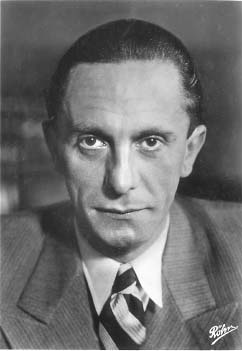
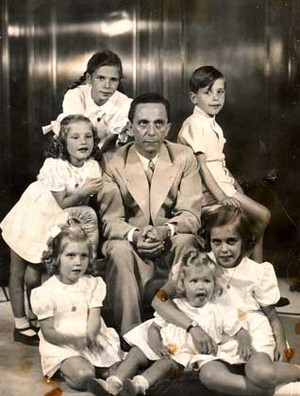
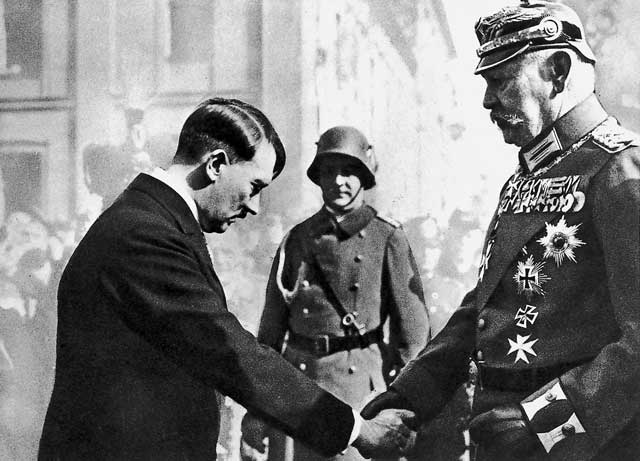
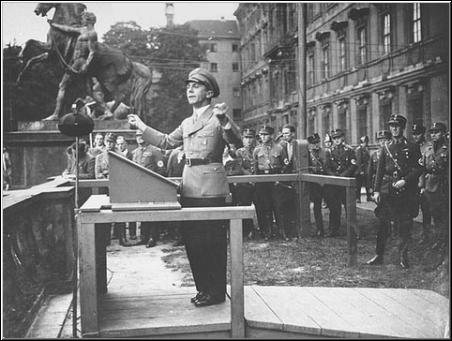
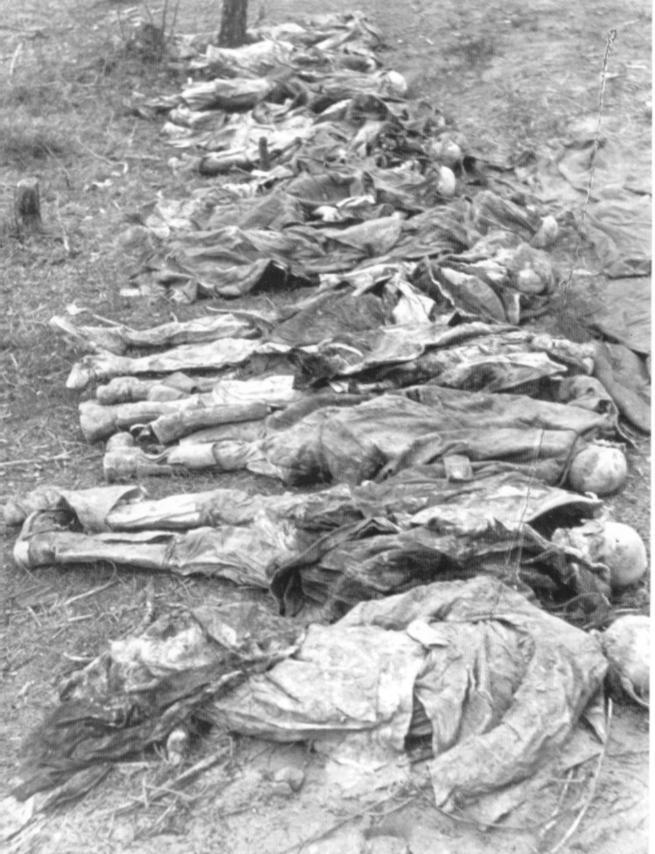
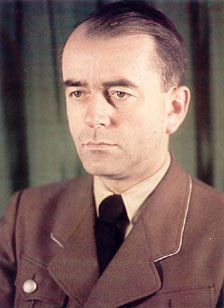
No comments:
Post a Comment